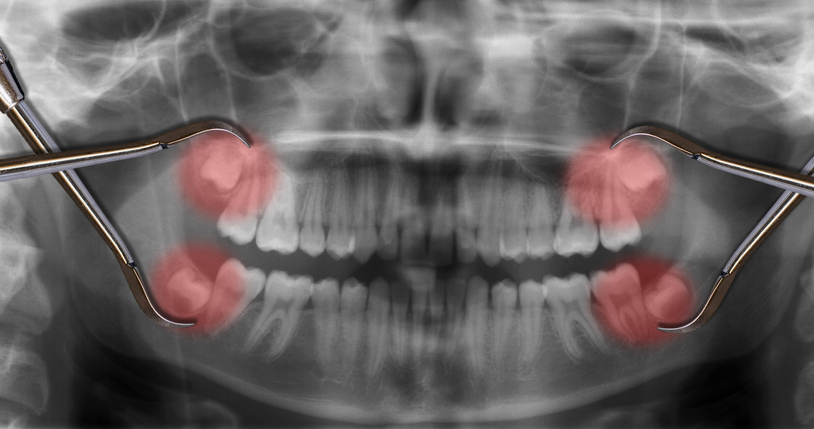Wisdom teeth are the last teeth to develop in your mouth, and they typically start coming in around age 17. While they’re not a necessary part of your smile, they can cause problems if they don’t come in correctly—or at all. Wisdom teeth removal is a common dental procedure and most people have no complications after the surgery. However, you should be prepared for some post-surgery symptoms like swelling, bleeding and pain medication side effects so you can get through your post-operative period more comfortably.
Tips for the first 24 hours
Here are some tips to make sure your first 24 hours after wisdom teeth removal are a breeze:
- Take the pain medication as prescribed by your doctor, but don’t take any more than that. If you need more pain relief, talk to your doctor about it before taking anything else on your own.
- Drink plenty of fluids to help keep your mouth from drying out and sticking together. Try ice water or tea if cold liquids are too uncomfortable for you at first; both will soothe sore lips and tongues, which can become very sensitive in the days following surgery.
Eating and drinking
You will be advised to avoid certain foods and drinks post-surgery. Some of these restrictions are necessary to ensure the healing process goes smoothly, while others are recommended to help you cope with pain and swelling.
Here’s what you need to know:
- Eat soft foods like pudding, jello, or mashed potatoes that are easy on the throat during this time. You should save your usual favorites until swelling goes down significantly (about two weeks). Otherwise you’ll risk reopening stitches and increasing healing time.
- Avoid hot and cold food – this can cause pain as well as internal bleeding, both of which could delay healing time. If you’re having trouble maintaining your temperature because of this, there is a possibility that your surgery was performed under sedation or general anesthesia (in which case it may be more difficult for you). In any case, stick with lukewarm beverages like tea or soup until instructed otherwise by your doctor.
- Avoid sticky foods – sticky foods get caught between teeth when they’re trying to heal after surgery. It is recommended to wait until at least one week from surgery before introducing sticky foods again.
- Avoid crunchy foods – this includes hard nuts, chips and other foods that are difficult to chew. These can cause damage to the gums or teeth as well as internal bleeding or tissue damage.
Nausea and Vomiting
Nausea and vomiting are common side effects of wisdom teeth removal. They can last for a few hours or up to one day after surgery. Nausea may feel like an upset stomach or the need to throw up. You may also feel sick to your stomach before or during surgery with or without vomiting. It is important to tell your dentist if you have nausea at the time of your surgery so they can give you medications that can help control it while they are removing your teeth.
If you do get nauseous, here are some tips on what works best:
- Drink plenty of water before and after surgery (the day before). Make sure to stay hydrated. This will help prevent dehydration which can cause nausea as well as headaches while healing from wisdom tooth removal surgery.
- Ask for anti-nausea medications from your doctor so they can prevent any possible discomfort from occurring during their procedure
- Use a cold compress on your forehead and back of your neck to help relieve any headaches that may occur after surgery. This will also help with swelling around wisdom teeth area.
Dizziness
Swelling is a natural part of the healing process after any dental surgery. The swelling should go down within 2-3 weeks and you should be able to resume normal activities. Do not pop any blisters that form on your gums, as this could lead to infection. You can use an ice pack or cold compress (such as a bag of frozen vegetables) for 15 minutes at a time for the first 48 hours after surgery if you experience swelling and discomfort.
Do not place heat on your gums, as this will cause them to swell even more! If you feel like using warmth would help relieve some of the pain associated with wisdom tooth removal, try holding something warm against your cheekbones for about 20 minutes at a time until it subsides—this may also help reduce swelling in some cases.
Make sure to take all prescribed medications according to dosage instructions provided by your dentist or oral surgeon; these medications may include ibuprofen or acetaminophen (Tylenol).
If your gums are still swollen after two weeks following wisdom tooth removal, contact your dentist or oral surgeon immediately. They may recommend that you take an over-the-counter pain reliever such as ibuprofen (Motrin) or acetaminophen (Tylenol). These medications can help reduce swelling and pain associated with wisdom teeth extraction.
Bleeding
If you notice blood on the gauze pad, it is completely normal. It is important to know what is normal and what isn’t when it comes to bleeding, so that you can tell if something is wrong or if you’re okay.
Normal bleeding occurs when the blood drips down onto the gauze pad on which you are resting your head during recovery. This will typically be brownish-red in color and not heavy enough to soak through the entire pad by itself. If this occurs, do not worry too much—it’s just part of recovering from Wisdom Teeth extraction surgery!
Heavy bleeding may mean that something went wrong during surgery. It’s important for a patients’ safety that they report any issues like this immediately so that doctors can go back into action quickly to prevent a serious problem from occurring.
Self-care is important post wisdom teeth surgery.
After wisdom teeth surgery, there are some things you can do to ensure that your recovery goes smoothly. The most important thing is to follow your doctor’s instructions and take care of yourself. Your doctor will probably recommend taking it easy for a few days following the procedure, so be sure not to overdo it when returning to normal activities.
Your dentist may also recommend taking certain medications after your wisdom tooth removal. Do not take other medications without first consulting with them as they could interact with those prescribed by your dentist or even cause complications in their own right
While many people do experience some discomfort following the removal of wisdom teeth, it’s important to know what symptoms are normal after oral surgery and when they require medical attention. If you experience severe pain, bleeding or drainage from your surgical site more than 24 hours post-procedure then we advise contacting your doctor immediately.
Dry Socket
A dry socket, or alveolar osteitis, is a painful condition caused by injury to the bone surrounding your tooth. In this case, your dentist will have removed one of your wisdom teeth and you’ll be left with an empty socket. A blood clot is necessary for healing and preventing infection in that empty space. But if that blood clot is dislodged from its position, it can cause an infection—and inflammation—that leads to dry socket.
Dry sockets are common after wisdom tooth extractions but can occur after any kind of oral surgery related to teeth removal (such as root canal). In addition to pain medication and warm compresses (the latter helps relieve pain), you may need antibiotics if there’s evidence of infection at your extraction site. It’s important not only to avoid dry sockets but also other common post-extraction complications like nerve damage or excessive bleeding due to improper care following surgery.
As you can see, wisdom teeth are a complex topic. Make sure to consult your dentist if you have any questions or concerns about your wisdom teeth, as they are the experts in this field. Visit us at Modern Mint Dental Care by calling 720-853-0350, emailing [email protected], or book online.




